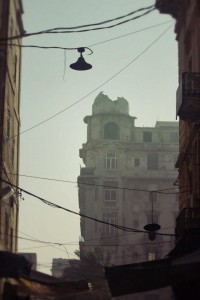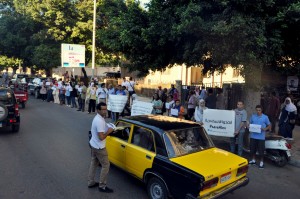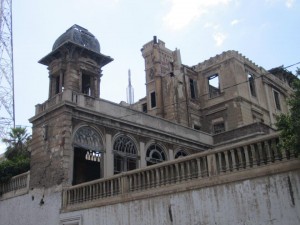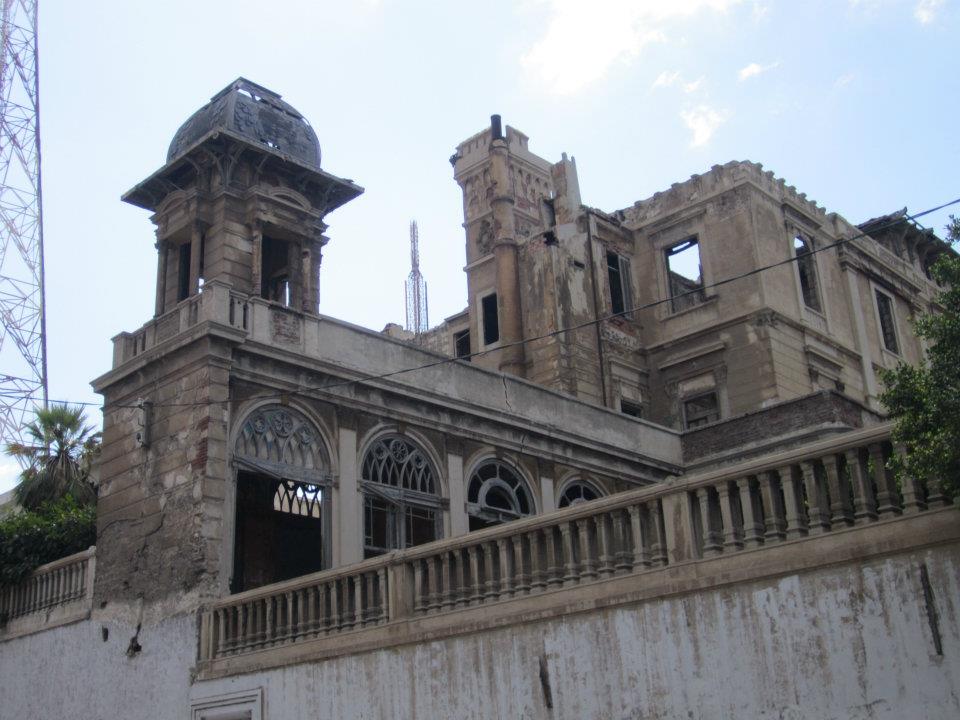
(Photo courtesy of Save Alex Facebook )
The Mediterranean city of Alexandria was until recently relatively small, but the exponential increase of residents over the past few decades has led to many social and architectural complications in its urban development. One of the worrisome effects has been the neglect and destruction of landmark buildings all over the city.
In an attempt to meet this demand, the city’s leading real estate companies opted for vertical development; the average height of buildings in Alexandria has increased recently to range between 20 to 22 storeys.
In the 80s and the 90s buildings would usually not exceed seven to eight storeys and the city featured many magnificently adorned historical buildings that represented its architectural heritage.
“Many of Alexandria’s historic structures were razed by the contractors’ bulldozers during the night. Under the cover of darkness the demolition process takes place, in only a few hours the building with all its memories and history is turned into rubble, in favour of a sum of money and investment,” said architect Mohammed Abul Kheer.
In an attempt to turn the tide Abul Kheer, together with a number of his peers, has launched the Save Alex initiative, which aims to raise awareness and save what is left of Alexandria’s architectural heritage.
The usual story of destruction starts with a contractor or a broker, who lures, and sometimes pressures, the owner of an old mansion to sell the property for a large sum of money. As soon as the structure falls into the hands of the developer the demolition process starts, regardless of the aesthetical or historical meaning of the property, in favour of a large apartment block, according to Abul Kheer. The price of one apartment in one of these new blocks can reach EGP 500,000.

(Photo courtesy of Save Alex Facebook )
“Most of these mansions are included in Alexandria’s historic buildings lists, which are protected by law from any demolition or development process,” Abul Kheer said. But due to the powerful network of real estate businessmen, corrupt police officers and district engineers and weak legislation, historic mansions are wiped out in violation of the law.
According to Save Alex, they stage many protests by threatened historic mansions to express their rejection of the destruction of the city’s rich heritage by the greedy real estate money makers. The initiative has recently succeeded in garnering quite a bit of public support. “We aim to increase the people’s awareness, but we are not only concerned with the aesthetical aspect of these buildings, we also stand up against the construction mafia, which have negatively influenced the citizen’s life and sabotaged municipal public facilities,” Abul Kheer said.
Save Alex has recently carried out a protest against demolishing the ex-German consulate building in the Kafr Abdou district, which is included in Alexandria’s architectural heritage list. They have succeeded in preventing the demolition of a number of other historic structures, like the Cicurel Villa, by rousing public opinion against the demolishers through protests and by getting their message out on local media channels.

(Photo courtesy of Save Alex Facebook )
“The natural urban expansion of Alexandria was, according to urban plans by official engineers, in the surrounding desert areas of Borg El-Arab. However, the inability to implement this strategy has come at the expense of the city’s aesthetic aspect represented in its historic buildings,” Abul Kheer said.
The weak state and the absence of a truly effective urban development plan are the main reasons behind this phenomenon, in addition to the state’s apathy towards the conditions in which the average citizens live.
Thorough studies, practical analyses of the urban state and scientific predictions, in addition to the state’s ability to strictly enforce the law against violators, would all contribute to the ability of enforcing the law against all violators, which will absolutely contribute to end the city’s loss of architectural gems.
The only current solution, according to the organisation’s founders, is to boycott the newly built tenements by the real estate moguls. “We do not aim to change the urban planning for the city, because that is on a larger scale than our current organisation’s abilities; we only aim to raise the public’s awareness,” Abul Kheer concluded.




